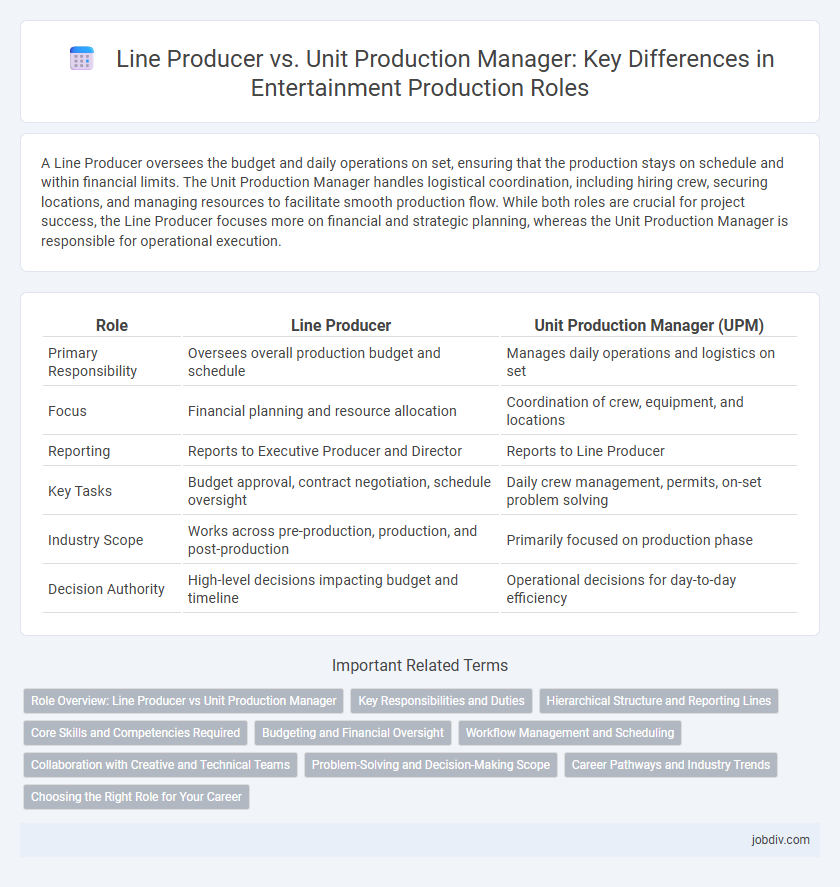A Line Producer oversees the budget and daily operations on set, ensuring that the production stays on schedule and within financial limits. The Unit Production Manager handles logistical coordination, including hiring crew, securing locations, and managing resources to facilitate smooth production flow. While both roles are crucial for project success, the Line Producer focuses more on financial and strategic planning, whereas the Unit Production Manager is responsible for operational execution.
Table of Comparison
| Role | Line Producer | Unit Production Manager (UPM) |
|---|---|---|
| Primary Responsibility | Oversees overall production budget and schedule | Manages daily operations and logistics on set |
| Focus | Financial planning and resource allocation | Coordination of crew, equipment, and locations |
| Reporting | Reports to Executive Producer and Director | Reports to Line Producer |
| Key Tasks | Budget approval, contract negotiation, schedule oversight | Daily crew management, permits, on-set problem solving |
| Industry Scope | Works across pre-production, production, and post-production | Primarily focused on production phase |
| Decision Authority | High-level decisions impacting budget and timeline | Operational decisions for day-to-day efficiency |
Role Overview: Line Producer vs Unit Production Manager
The Line Producer oversees the entire production budget and scheduling, ensuring the project stays on time and within financial constraints. The Unit Production Manager handles daily operations on set, coordinating logistics, managing crew, and facilitating communication between departments. While both roles are crucial for efficient production, the Line Producer focuses on high-level planning and financial control, whereas the Unit Production Manager concentrates on on-the-ground execution.
Key Responsibilities and Duties
Line Producers oversee the overall budgeting, scheduling, and coordination of a film or television production, ensuring that all departments work efficiently within financial constraints. Unit Production Managers are responsible for the day-to-day operations on set, managing logistics, crew, and resources to maintain smooth production flow. Both roles collaborate closely to balance creative vision with practical execution, optimizing time and cost management.
Hierarchical Structure and Reporting Lines
In the entertainment industry, a Line Producer oversees the overall production budget and schedule, reporting directly to the Executive Producer or Producer, while the Unit Production Manager (UPM) handles day-to-day operations and logistical coordination, reporting to the Line Producer. The hierarchical structure places the Line Producer above the UPM, ensuring strategic financial and operational alignment. Clear reporting lines maintain efficient communication flows, with the UPM managing crew and resource allocation under the guidance of the Line Producer.
Core Skills and Competencies Required
Line Producers excel in budgeting, scheduling, and overall production coordination, requiring strong financial acumen and leadership skills to manage resources efficiently. Unit Production Managers specialize in logistical planning and crew management, demanding expertise in contract negotiation and on-set problem-solving. Both roles require proficiency in communication, organizational abilities, and a deep understanding of film production workflows to ensure smooth project execution.
Budgeting and Financial Oversight
Line Producers concentrate on overall budgeting, ensuring that the production stays within financial limits by allocating resources across departments efficiently. Unit Production Managers handle day-to-day financial oversight, tracking expenditures against the budget and managing purchase orders and payroll on set. Both roles collaborate closely to maintain fiscal discipline and optimize cost control throughout the film or television project.
Workflow Management and Scheduling
Line Producers oversee the entire budget and resource allocation, ensuring that the production stays on schedule and within financial constraints. Unit Production Managers focus on the day-to-day operational workflow, coordinating crew schedules, locations, and equipment to optimize on-set efficiency. Their combined efforts streamline production timelines and mitigate delays in film and television projects.
Collaboration with Creative and Technical Teams
Line Producers and Unit Production Managers collaborate closely with creative and technical teams to ensure seamless production workflows and budget adherence. Line Producers oversee overall production logistics while facilitating communication between directors, cinematographers, and department heads to align creative goals with practical execution. Unit Production Managers handle day-to-day operations, coordinating schedules and resources to support the creative vision and technical requirements on set.
Problem-Solving and Decision-Making Scope
Line Producers handle overarching problem-solving related to budgeting and scheduling, ensuring that production stays on track and within financial constraints. Unit Production Managers focus on day-to-day decision-making, resolving logistical issues such as crew coordination, equipment, and location management. Both roles require quick, effective problem-solving, but Line Producers operate on a macro level while UPMs manage micro-level challenges on set.
Career Pathways and Industry Trends
Line Producers typically advance from Production Coordinators or Assistant Production Managers, specializing in budgeting and scheduling, while Unit Production Managers often emerge from roles emphasizing logistical oversight, such as Production Supervisors. Industry trends highlight an increasing demand for tech-savvy professionals in both roles due to digital production tools streamlining workflows. Career pathways now favor candidates with strong financial acumen and leadership skills, aligning with evolving production complexities in film and television.
Choosing the Right Role for Your Career
Choosing between a Line Producer and a Unit Production Manager depends on your career goals and skill set within film and television production. Line Producers oversee the entire budget and scheduling, requiring strong financial acumen and leadership, while Unit Production Managers handle day-to-day operations on set, emphasizing logistics and problem-solving. Understanding the scope of responsibilities and your strengths helps align your career path with industry demands for efficient project delivery.
Line Producer vs Unit Production Manager Infographic

 jobdiv.com
jobdiv.com